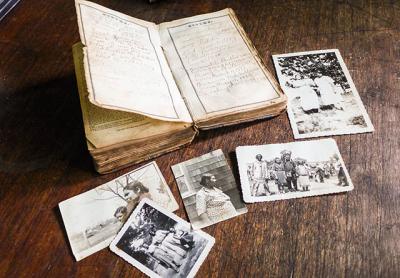In Old Bibles, Rare Tribal Record

From the appearance of their worn leather covers, the pair of Bibles that had been passed down in a local family for decades may not look all that significant. However, written in careful script within them is an apparently unique record of births, marriages, and deaths among the Montaukett Tribe of Native Americans — one that may play a role in the tribe’s bid to regain its official status.
The Bibles and a rare set of photos of tribe members, which have been placed at the Montauk Library for safekeeping, were kept by the Butler family, beginning in the 1840s.
Art Lucas, a Montauk resident who is related to the Montauketts by marriage, looked after them until they went to the library archive last week. He had received them from Lillian Ammon Ryan, an elderly relative who lives in Maryland, who, in turn, had received them from Madalyn Butler Ammon, who lived at Barnes Landing in Amagansett and died last year at 88.
“She wanted them to go the archives,” Mr. Lucas said. The Bibles, he said, show that the Montauketts remained in the area and maintained a sense of tribal identity into the present day.
“The Bibles are a very, very rare thing,” Maura Feeney, the Montauk Library archivist, said. “This is an unusual record. The photographs are just priceless. When he showed them to me, I got heart palpitations.”
The tribal continuity that the entries represent span the period at the beginning of the last century, when a court declared the tribe extinct. The Bibles’ pages tell another story.
Pages left deliberately blank when the Bibles were printed were filled over time with milestones. Between the Old and New Testaments in an 1844 Bible — the older of the two — are found the births of Hannah L. Cuffee on April 25, 1841, and Samuel L. Butler on June 21, 1845. Turning the page over, the deaths of Isaac B. Fowler and John A. Fowler on Dec. 11 in what appears to be the year 1851 are recorded; Mr. Lucas said that he believed they drowned in a fishing accident.
While the chronology of life events contained in the Bibles is clear, their history is somewhat less so.
The Montauketts have had a long and difficult relationship with the state, as well as with the mostly English colonists who began to arrive in the mid-1600s. Nearly 300 years later, a low point came when Arthur Benson, a millionaire industrialist, was able to displace the remaining tribal members from their ancestral land in Montauk toward the end of the 19th century. A court case dragged on for nearly 20 years, culminating in the 1910 decision that stripped the Montauketts of their legal status.
Another blow came in 1923 when a group of Montauketts led by Maria Pharaoh traveled to Washington in an unsuccessful bid to get help from the Bureau of Indian Affairs.
More recently, Robert Pharaoh, a descendant of Maria Pharaoh, and others have continued the fight to regain tribal recognition, and the Bibles could prove decisive.
Mr. Pharaoh, who is the Montaukett Nation’s grand sachem and chief, titles handed down through his family, said he was looking forward to seeing the Bibles sometime after Labor Day.
Tribal continuity is a critical component of the tribe’s attempt to regain its legal status with the State of New York. A bill passed this summer by the State Legislature would restore the tribe’s status. It awaits the signature of Gov. Andrew M. Cuomo.
“This helps prove the case that we are attempting to make regarding the Montauketts and recognition,” said State Assemblyman Fred W. Thiele Jr. “Regardless of what some state judge said in 1910, you can’t erase history.”
Mr. Thiele said that he and Mr. Pharaoh planned to meet with the governor’s representatives soon. He said that they were making an extra effort because of a 2013 veto of a similar bill that would have granted the tribe official status. “We want to give the governor all the reasons why he should sign the bill,” he said.
Recognition will not change the lives of the remaining tribal members, Mr. Thiele said. Initially, it could bring education and health care benefits, for example. Nor, he said, was it tied to plans for casino gambling or land claims, of the sort made by tribes elsewhere in the Northeast.
Ms. Feeney, the Montauk Library’s archivist, said that she was overjoyed that the Bibles, along with the small group of Butler family photos, have now been housed in the climate-controlled collection.
“It is like a sacred trust, preserving the memory of Montauk, and that includes the Montaukett people,” she said.
